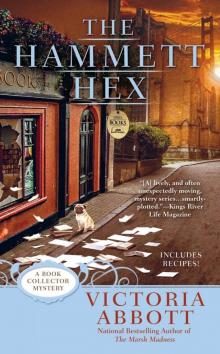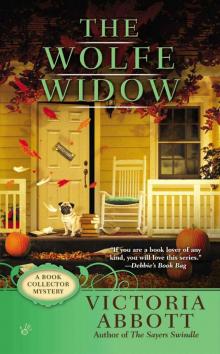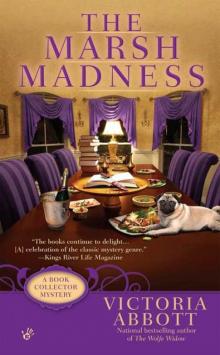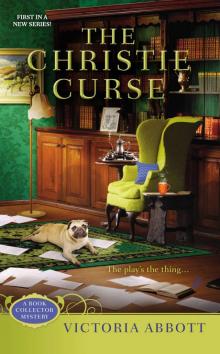- Home
- Victoria Abbott
The Christie Curse
The Christie Curse Read online
Accidents will happen…but will
they happen twice?
As I stepped out the rear door, trying not to grin at thoughts of lounging in my very own claw-foot tub, I bumped into the invisible man. Well, I suppose he wasn’t really invisible, but he was so fair and so pale that he seemed almost translucent. I could almost have sworn that the postal uniform was walking on its own.
“So, it’s you,” he said.
“Sorry?”
“The new one. You are the new one.”
I stared. “The new what, exactly?”
He blinked and raised his pigment-free eyebrows. “Maybe I shouldn’t have said anything.”
“About what?”
As he walked past me into the house, he said with a small, reassuring smile, “I’m sure everything will be fine this time. That other thing might have been an accident for sure.”
This time I stared at his back and watched as the dark old-fashioned door closed behind him, leaving me more than a little creeped out. Our postman just drops off the mail. He doesn’t walk right into the homes on his route.
Almost an accident?
Why did everyone in the Van Alst vicinity speak in riddles?
And what kind of accident?
THE
CHRISTIE
CURSE
VICTORIA ABBOTT
BERKLEY PRIME CRIME, NEW YORK
THE BERKLEY PUBLISHING GROUP
Published by the Penguin Group
Penguin Group (USA) Inc.
375 Hudson Street, New York, New York 10014, USA
USA / Canada / UK / Ireland / Australia / New Zealand / India / South Africa / China
Penguin Books Ltd., Registered Offices: 80 Strand, London WC2R 0RL, England
For more information about the Penguin Group, visit penguin.com.
THE CHRISTIE CURSE
A Berkley Prime Crime Book / published by arrangement with the author
Copyright © 2013 by Penguin Group (USA) Inc.
All rights reserved. No part of this book may be reproduced, scanned, or distributed in any printed or electronic form without permission. Please do not participate in or encourage piracy of copyrighted materials in violation of the author’s rights. Purchase only authorized editions.
Berkley Prime Crime Books are published by The Berkley Publishing Group.
BERKLEY® PRIME CRIME and the PRIME CRIME
logo are trademarks of Penguin Group (USA) Inc.
For information, address: The Berkley Publishing Group,
a division of Penguin Group (USA) Inc.,
375 Hudson Street, New York, New York 10014.
ISBN: 978-1-101-61944-5
PUBLISHING HISTORY
Berkley Prime Crime mass-market edition / March 2013
Cover illustration by Mary Ann Lasher.
Cover design by Olivia Andreas.
This is a work of fiction. Names, characters, places, and incidents either are the product of the author’s imagination or are used fictitiously, and any resemblance to actual persons, living or dead, business establishments, events, or locales is entirely coincidental. The publisher does not have any control over and does not assume any responsibility for author or third-party websites or their content.
PUBLISHER’S NOTE: The recipes contained in this book are to be followed exactly as written. The publisher is not responsible for your specific health or allergy needs that may require medical supervision. The publisher is not responsible for any adverse reactions to the recipes contained in this book.
ALWAYS LEARNING PEARSON
For Giulio Maffini, our miracle man. Welcome back!
ACKNOWLEDGMENTS
We are grateful to so many people who helped us in the course of this book. Some brought information, others inspiration, while many shared the kind of support and friendship you need to write a book.
Thanks to mystery readers and book collectors everywhere and to the booksellers and dealers who help them feed their habit. But special thanks are due to Jeff and Donna Coopman of The Usual Suspects, Don Longmuir (and family) of Scene of the Crime, Maggie Mason of Mary Mason Bookseller and Dee Suchall for insight and “intel.”
Wendy Bartlett and her colleagues at the Cuyahoga County Public Library showed us the potential of a proper attic in the right mansion at the South Euclid Branch and inspired Jordan’s garret.
We appreciate our lovely, supportive agent, Kim Lionetti at BookEnds, and at Berkley Prime Crime, our always urbane editor, Tom Colgan, the very helpful and capable Amanda Ng and our brave, mysterious copyeditor.
Thanks to our pal Erika Chase and our friends in the Ladies’ Killing Circle, Mystery Lovers’ Kitchen, Killer Characters, and Crime Writers of Canada who have been so supportive in a tough year. With Linda Wiken, we share a love of collecting books that has been known to end up in the purchase of a bookstore.
Much gratitude is due to Kory Webber, Pat Connolly and Doug Martin for endless support and to Giulio Maffini for his amazing Lazarus routine.
We would also like to pat each other on the back because we are still alive, smiling and plotting away, ready to launch our first collaborative effort and knee-deep in the second, The Sayers Swindle. We have to admit, any errors are entirely ours.
Last but not least, where would we be without the great Agatha Christie? She taught generations of readers and writers to look at everything and everyone differently and gave the world her enduring legacy.
Table of Contents
Chapter One
Chapter Two
Chapter Three
Chapter Four
Chapter Five
Chapter Six
Chapter Seven
Chapter Eight
Chapter Nine
Chapter Ten
Chapter Eleven
Chapter Twelve
Chapter Thirteen
Chapter Fourteen
Chapter Fifteen
Chapter Sixteen
Chapter Seventeen
Chapter Eighteen
Chapter Nineteen
Chapter Twenty
Recipes
CHAPTER ONE
IF I HADN’T been desperate for a job and a new place to live, I might have made a run for it as soon as I got a good look at that sour face. But I was feeling the pinch, and in a sea of want ads seeking waitstaff, topless dancers and telemarketers, this job description was clearly written for me.
RESEARCHER REQUIRED
Discreet, flexible and educated individual required to research documents and artifacts. Must be free to travel, and possess valid driver’s license and reliable vehicle. The successful applicant must be willing to relocate to Harrison Falls, New York. Accommodation will be provided. Do not bother to reply unless you have an excellent grasp of the English language. Knowledge of Latin will be considered a distinct asset. Good personal hygiene and formal wardrobe required. Should be able to cope with irregular schedule. Must appreciate cats. No allergies please. Three references, official transcripts and other documentation to be produced at interview.
The inscription on my master’s degree was barely dry, much like the red ink on my student loans. My former mooching boyfriend had maxed out my credit card before I’d managed to catch on and dump him. The only thing healthy was my run of bad luck. I could feel my PhD possibilities receding. There wasn’t much call in our area for an enthusiastic graduate in English with a minor in languages and a fondness for Jane Austen and the Brontës. I had all the qualifications, and my family is nothing if not discreet, for reasons that are nobody’s business but our own. Plus my references were solid. I was already back in Harrison Falls, and I figured I could always fake the cat thing. There was no clue as to who was offering this position, but I figured I had n
owhere to go but up.
* * *
I MUST HAVE made the right impression because I was instructed to present myself for an interview with Miss Vera Van Alst at three in the afternoon, Thursday, May 17, a mere two days after I’d sent my application to the PO box address. Apparently, everyone in Harrison Falls knew exactly who Vera Van Alst was. My own relatives were very happy to fill me in about the Van Alst Shoe Company, now sadly defunct, and the devastating impact of the failed business on the community. The general opinion was that if there’d been awards for arrogance and ineptitude, the Van Alsts would have won them hands down.
Now Vera Van Alst was the only one left.
I pasted on my best interview smile, adjusted my posture and headed for the imposing house from which she and the Van Alst family had lorded it over the town of Harrison Falls for a hundred years. I already knew it wasn’t going to be easy.
The massive dark granite building had umpteen white-trimmed bay windows, a conservatory, crenellations and faux turrets. It gave new meaning to “imposing.” As I approached, I was struck by the scent of fresh-cut grass, possibly my favorite aroma in the world. A middle-aged man with a straw hat was riding a tractor along the front lawn of the house. I smiled and waved. I got a curt nod in response. Oh well, I figured he would be kept busy keeping that vast property groomed.
The reception didn’t get any better.
When the paneled oak door swung open, a gray-haired, pointy woman in a wheelchair looked up and eyed me as if I was something brown and gooey that had attached itself to one of her wheels. She hadn’t bothered to introduce herself, but I knew from my research that she was Vera, the last of the Van Alst family, and possibly the most hated woman in Harrison Falls.
Once again, my smile had been a waste of energy, and by now it was starting to hurt my face.
“I was expecting a man.” Beside the wheelchair a conceited-looking blue point Siamese cat glanced over its shoulder and licked its fur in disdain.
I kept my cool. “Understandable mistake.”
Vera Van Alst showed her teeth and enunciated in a peculiar voice. “Jordan. That’s a man’s name.”
How would I describe that voice? Like crunching gravel? A cascade of pebbles? It would take some getting used to, as would her attitude.
I said, “A man’s name? Not in my family. I’m named after my mother.” I didn’t mention that my mother had been Jordan Kelly, as the Kelly name was probably enough to get me booted out the front door. As they say, you can choose your friends but you can’t pick your relatives.
“Jordan Bingham? I don’t know any Binghams. Humph, with that black Irish coloring, I would have figured you for a Brennan or a Ryan. But it doesn’t matter because you are not at all what I had in mind.”
My coloring? I figured there was nothing wrong with having pale skin, dark hair and blue eyes. I decided to ignore any ethnic slurs about my appearance, because I was exactly what she had in mind, and if she didn’t know that, I did. You don’t need testosterone to read Latin. Time to steer the conversation away from my heritage.
“My, what a beautiful cat,” I lied.
Vera Van Alst seemed to soften slightly, and I took that opportunity to step further into the house. I noticed that there was a serious security system by the entrance. My potential employer did a one-eighty in her wheelchair and headed across the grand foyer. I had nothing to lose. I followed her as we turned left and rumbled down a long dim corridor, past looming portraits of what must have been dead and disapproving ancestors. There would be no possible esthetic reason for displaying them otherwise. Apparently, the cat also disapproved, judging by the flick of its tail as it preceded us down the hall.
This time, I inhaled the scent of furniture wax and old roses. We passed what I took to be a ballroom, a sitting room and a gallery of sorts before reaching what she called “the study” on the left. Miss Van Alst wheeled into the large room. Uncomfortable Victorian furniture hugged the twelve-foot-high walls. Much of the wall space held clustered portraits of even more disapproving ancestors. What had caused those expressions? Dental problems? Constipation? Whatever. In my humble opinion, that was one scary gene pool. The cat, seemingly reading my mind, flicked its tail yet again and sneered in agreement. It was a relief to glance at the tall Georgian windows, flanked by faded silk drapes, which had possibly once been red. Outside, the vast green lawns looked very appealing, but they were not why I was there.
“I have my references and other paperwork.” I reached into my deep-orange vintage leather satchel.
Miss Van Alst replied, “Not that it will make the slightest difference to me. I am looking for a man to do this job.”
I held out the documents in their crisp envelope. She waved them dismissively toward a spectacular desk behind her. Unless I missed my guess, it was Edwardian. Carlton House almost certainly. It would take at least fifteen grand to buy that baby today, and from my preinterview research, I was pretty sure Vera Van Alst’s great-grandfather had purchased it when he furnished this massive pile of stone back in the late nineteenth century. I had inherited my uncle’s ability to appraise valuables upon first sight, though I tended not to use this skill to the same ends. Someone in the family had to go straight.
On the walls around the room were shadowboxed memorabilia from the Van Alst Shoe Company. Old grainy photos of Van Alst men above tarnished brass plaques hinted about a proud past and thriving business. My uncles would practically spit on the ground and swear at the mention of the Van Alsts, but I really wasn’t sure how the family fortunes had slipped. I thought better than to pry during my interview. Vera didn’t seem like the type to swap family stories, so I snapped back to attention.
As I placed the envelope on the desk, the cat leapt up and settled on it, stretching out a back leg and continuing with the cleanup. The perfect job was growing warts, but it didn’t matter, because I was in no position to be picky. A mental image of my future self in a paper hat cleaning a commercial deep fryer steeled my resolve to win her over. She swiveled slowly in the wheelchair. Her beady eyes narrowed. She said nothing. I was struck by the sharp contrast between her ratty appearance and the gorgeous, priceless and, yes, dusty antiques that surrounded her. I knew from experience that many people with the best minds care nothing for personal appearance. However, Vera Van Alst seemed to be doing her best to look her worst. Her bland, worn wardrobe aged her by decades. The holey elbows and frayed cuffs of her dull beige sweater didn’t help. Judging by the style of the shoulders, I figured she’d had it since the mideighties. I waited. Nothing.
I decided to push my luck. “I think you’ll find that I will do a better job than a man.”
“Better than a man? How so?”
I took a deep breath and rattled on. “I graduated summa cum laude. I minored in languages. I worked in the rare book room at my college. I’ve held rare and wonderful writings in my hands. Wearing white cotton gloves, of course.”
“Bah. You’ll have to do better than that.”
Of course, I couldn’t give her any of the real reasons why I was suited for the job.
“I am educated, well spoken and have had considerable responsibility in my life. I have good instincts for finding things and information. And I want to work for you.”
I didn’t say it was because of the Carlton House desk or because I was desperately broke or that there was no way I could live with my uncles on a permanent basis or that I was terrified of yellow paper hats.
She stared at me without blinking. Finally, she broke the silence with, “You have two weeks. Don’t disappoint me.”
I hoped she didn’t hear me exhale in relief. Clearly, she only respected strength.
“I’ll need to know what the job will involve.”
Vera Van Alst whipped around, and the creases surrounding her lips grew deeper. She wheeled toward the desk and picked up a file. “You may as well sit down.” She pointed to a Victorian fainting couch upholstered in amethyst velour. I figured the color had st
arted out as a regal purple.
I lowered myself carefully onto the faded fabric. The couch squeaked in protest. To tell the truth, I’d felt more in control standing up. Which she knew, without a doubt.
“I’ve heard whisperings of a manuscript that—”
The door flew open with a bang, scattering dust particles. A small, round, doughy-faced person pushed a tea cart into the room. She was dressed in black with a wide white apron and, at a guess, she was somewhere on the high side of seventy. Her hair was an unlikely shade of ebony and pulled back into a tight bun. Except for the bun, the hair might have been painted on her head. She stopped and placed her hands on her wide hips. “Tea is serve, signora.”
Vera waved her away. “Not now, Fiammetta. We are right in the middle of something important.”
“Yes, yes, yes. But now tea.”
That seemed oddly dismissive. I felt a swell of admiration for this pushy apple doll.
“Tea can wait.”
“No, no, no. Teatime. You must eat. Eat now.”
“Fine. Then will you leave us alone? Jordan, this is Signora Panetone. Do not allow her to bully you.”
I could hardly stop myself from drooling at not only the fine Georgian tea service and the antique tea trolley, but also the astounding contents. There were cucumber sandwiches, shortbread cookies, fruit, a cheese plate and a chocolate layer cake. I wondered who would be joining us. A committee of some sort? A football team? But apparently no one.
The small, round woman turned to me and said, “Mangia. Eat.” She pointed a pudgy finger at me. “You. Eat!”
And she meant it.
Who was I to argue with authority? Of course, I was dying to know what manuscript was being whispered about. However, that would have to wait.
Fifteen minutes later (and three return visits with extra food), we finished up. Miss Van Alst had eaten like a bird. I had also eaten like a bird. A really big bird, say, a turkey vulture.

 The Hammett Hex
The Hammett Hex The Wolfe Widow (A Book Collector Mystery)
The Wolfe Widow (A Book Collector Mystery) The Marsh Madness
The Marsh Madness The Christie Curse
The Christie Curse